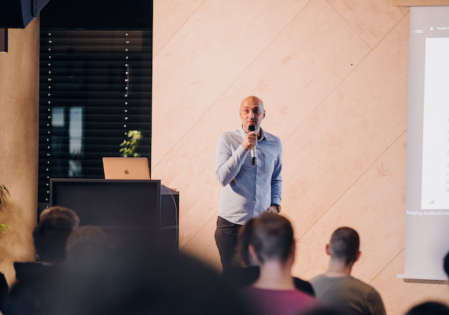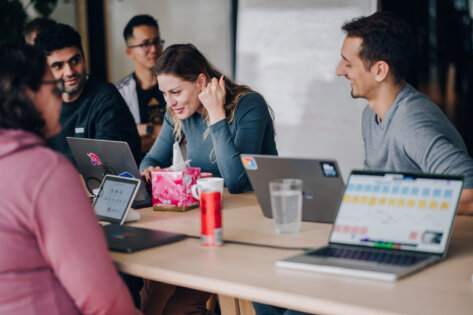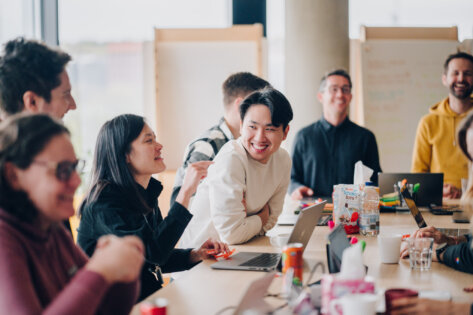What I’ve done, learned, and taught during my first 4 weeks as a front-end engineer at productboard!

Leaving the flatlands
Being a Dutch person with a deep passion for the mountains sucks. The Netherlands is one of the flattest countries in the world, and a big part of The Netherlands is literally below sea level. So after having lived there all my life, I was craving moving somewhere closer to mountains, lakes, and forests. After considering Canada, Ireland, and Scotland, my wife and I decided on The Czech Republic, and more specifically Prague.
Ironically, people here in Prague laugh at me when I explain that this was my initial motivation for moving here. They’re not that impressed with the mountains in and around the Czech Republic. But for someone coming from a flat country, having to walk up and down several hills just to get to work is simply fantastic!
Finding productboard
I was already familiar with productboard because I actually introduced it to my previous company to help us with our product management process. A few months later, September 2018—just a week after I decided to move to Prague—Ashley posted this message in the productboard customer Slack group:

I thought, “Wait… productboard has an office in Prague?!” My excitement level began to rise. I opened their job page, and there was an open position for a Front-End Engineer!
The strangest place to have an interview
I reached out to productboard’s recruiter, Tereza, and a few days later we had a video call discussing the details of the position. We were both very excited, and a couple of days later, Tereza reached out to me to schedule a video call with Daniel, productboard’s CTO. However, I was leaving to volunteer in India from October until December, which posed some difficulties. productboard had no prior experience with remote interviewing, but they made it happen anyway. What I noticed about the company is that if there’s no process in place, they will create one as they go. And I quickly learned I would need to do the same…
And so a couple of weeks later, I had a video call with Daniel…
In the back of a car…
In India.
That was, well, very interesting. As I had come to learn, nothing goes as planned in India (I could write a whole bunch of posts about that). So even though I planned on being somewhere quiet to have an undisturbed call to convince Daniel that I was the perfect candidate for this position, I instead had to do it in the back of a car with sketchy internet, cars honking, and tuk-tuks racing around us.
Fortunately, even with India’s traffic conditions, I had a great conversation with Daniel along with a few other folks who I’d come to work with. And a day after talking to Hubert, the CEO, Tereza told me I’d been hired!
The first four weeks of my adventure
I’m now four weeks in, and it has been amazing so far. Since then, we’ve moved offices, announced the newest round of funding, welcomed 6 new colleagues, had a board game night, an Italian food night, and so much more. There’s a real startup culture, meaning that nothing is set in stone and there’s a lot of room to give feedback and to help set up processes. For example, there’s wasn’t a documented process for expats, so I’m documenting my entire experience as a foreigner moving to the Czech Republic to help new colleagues with their relocation.
There are so many learning opportunities. I’ve only ever worked for startups with no more than 6 engineers. At productboard however, there are currently around 30 engineers. I never want to be the smartest guy in the room, as this can inhibit you from learning new things. With 30 people working in the same field as you, there are always new things to learn. Did you know for example, that testing and deploying new code could be a real breeze using Redis? Or do you realize how much you can improve your developer experience using the right TSLint rules? And what about the processes necessary for 30 engineers working on a shared codebase where the front end already consists of over more than 3,500 files?
There are a lot of ways to teach as well. For example, I’m currently helping to formalize our git processes. I’m also actively involved in bringing our open source game to the next level.
There are also so many opportunities to work with the latest technologies. We’re already talking about how to use React Hooks in our codebase! And we’ve started publishing open source code to give back to the community and help further advance the JavaScript ecosystem. We’re halfway through migrating our front end code base to TypeScript, creating a new testing environment using Cypress, and using a Docker setup for our back-end.
Come for the mountains, stay for the wonderful people
The first 4 weeks have been a blast, and I’ve already learned so much. I’ve also come to really enjoy Prague, including the many cultural activities and the nature right around the corner—especially the mountains!
I think my best closing words are what I wrote to the team after my first week:

Want to hear more from Maurice? Listen to him on our productboard podcast!







